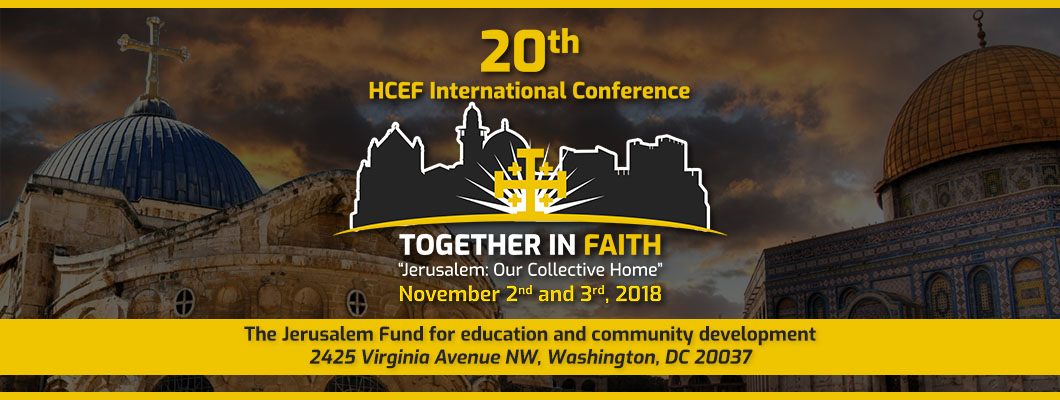This international conference, held in partnership with the Organization of Islamic Cooperation, Know Thy Heritage, Inc. and others, will pay particular attention to the Question of Jerusalem. After providing a report on the city’s evolving status, it will present interfaith viewpoints on the meaning of Jerusalem and what Palestinian Christians and Muslims are doing to advance its educational, cultural, and social life.
Conference Program
Prof. Saliba Sarsar, Ph.D.: Chair, HCEF Research and Publication Committee, and Professor of Political Science, Monmouth University
Stephen B. Corbin, D.D.S., M.P.H, Former Vice President, Special Olympic
Friday
| 9:00-10:00 | Registration |
| 10:00-11:00 |
Opening Ceremony Sir Rateb Rabie, KCHS This opening ceremony is special as HCEF celebrates its 20th anniversary and does so in partnership with the Organization of Islamic Cooperation (OIC) and KTH. HCEF President/CEO and three ambassadors, representing the OIC, Palestine, and Jordan, will share their impressions of Jerusalem and ways to ensure its future as the collective home of humanity. |
| 11:00-12:15 |
Plenary Session: What Jerusalem Means to Us: Jerusalem is the spiritual home of the three monotheistic faiths of Judaism, Christianity, and Islam. Each has a stake in it. In this panel, Christian and Muslim leaders will share their views on the Holy and Human City and what Christians and Muslims can do to preserve its soul and spirit before it is too late. Moderator: Fr. Michael McDonagh, Senior advisor to the Apostolic Administrator of the Latin Patriarchate of Jerusalem and Archbishop of Jerusalem |
| 12:15-2:00 |
Lunch |
| 2:00-4:00 |
Advocacy on and Solidarity with Jerusalem: Jerusalem’s sacredness and national significance raise questions about the role of religion in conflict and peace and the relationships between the religious and secular authorities. Several Christian, Jewish, and Muslim leaders as well as peace organizations are active in bringing awareness about and supporting Middle East peace. These relate to interfaith dialogue and solidarity, as well as the religious response to secular decisions. This roundtable will explain the necessity of peace, in addition to how religious institutions and secular organizations can better influence the future course of events in the United States and beyond. Moderator: Sir Rateb Y. Rabie, KCHS, President/CEO of HCEF |
| 6:00pm -10:00pm |
Reception and Celebratory Banquet Master of Ceremonies: Stephen B. Corbin, D.D.S., M.P.H |
Saturday
| 8:30-9:30 | Registration |
| 9:30-10:00 |
Welcome and Introduction to Conference |
| 10:00-11:30 |
Palestinian Geopolitical Status under the Israeli Occupation, with a Special Focus on East Jerusalem Jewish settlements in East Jerusalem and the West Bank and the Israeli separation wall on Palestinian territories have complicated Palestinian daily life and have been serious obstacles to peace between Palestinians and Israelis. This presentation will focus on their impact on Palestine and the larger issue of peace. Moderator: Dr. Hanna Hanania, HCEF Board members, Member of the Palestinian National Council and of the Palestinian Central Council |
| 11:30-12:30 |
Enlivening Jerusalem: Christian and Muslim Contributions to the City’s Education, Culture, and Social Advancement There is a substantial Christian and Muslim presence in Jerusalem, including religious, educational, and social service institutions and organizations. The challenges include cultural-social constraints, an ongoing Palestinian-Israeli conflict, a 51-year old occupation, and a lack of funds. This panel will explore what Christians and Muslims are doing to advance the education, culture, and social life in Jerusalem. Moderator: Fr. John Predmore, S. J., HCEF Board Member |
| 12:30 – 1:00 |
Visual Presentation, HCEF “Keeping Our Vision Alive” |
| 1:00 – 2:00 |
Lunch |
| 2:00 – 2:45 |
Keynote Address: Status of Palestinian Higher Education, Challenges and Opportunities Dr. Abdullatif Abuhijleh |
| 2:45 – 3:45 |
East Jerusalem and the Palestinian Religious Tourism Industry The Palestinian tourism industry in East Jerusalem faces unique challenges, including Israeli restrictions on new hotels and tourist companies, poor infrastructure, and high taxes. These are in addition to the seasonal nature of Christian and Muslim pilgrimages, the lack of proper coordination and a common strategy among Palestinians working in tourism, and competition from the Israeli tourism sector. This panel will examine these and other challenges as well as the huge potential for growth. Moderator: Jad Daniel, Ph.D. Management Consultant Sir Rateb Rabie, KCHS |
| 3:45 – 5:00 |
Jerusalem Key to Palestinian-Israeli Peace Peace negotiations between the Palestinians and Israel are at a standstill. By recognizing Jerusalem as Israel’s capital, moving its embassy from Tel Aviv to Jerusalem, halting its funding to UNRWA, and closing down the mission of the Palestinian Liberation Organization in Washington, DC, the United States has practically stopped being an even-handed peace mediator. By continuing its occupation and by recently enacting its basic Law, “Israel, the Nation-State of the Jewish People,” Israel has shown its true intentions, mainly its lack of seriousness about peace with the Palestinians. Are we at a dead end? How can peace be advanced? This panel will present what it takes to re-ignite the peace flame. Moderator: Prof. Saliba Sarsar, Ph.D., Chair, HCEF Research and Publication Committee & Professor of Political Science, Monmouth University |

